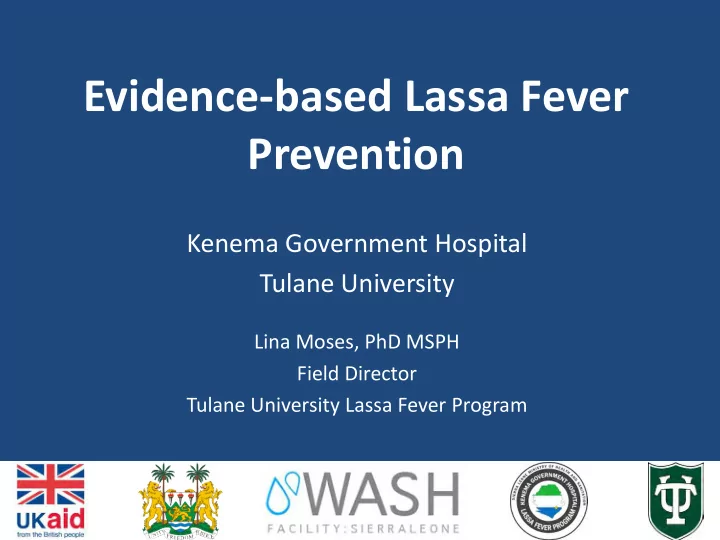

Evidence-based Lassa Fever Prevention Kenema Government Hospital Tulane University Lina Moses, PhD MSPH Field Director Tulane University Lassa Fever Program
Evidence-based Lassa Fever Prevention and WF 015 Integration into Kenema WASH Programmes Project Start: 14 August 2012 • Project End: 31 July 2014 • Partners: • – Tulane University – MOHS, Kenema Government Hospital – GOAL—sanitation marketing £199,781 WASH Facility, supplemental funds from Tulane • Location: rural, Kenema, Bo, Kailuahun districts • WF Themes • – Capacity building in the WASH Sector – Small-scale pilot projects – Research, advocacy & sector learning
Lassa Fever • Fever, aches and pains, bleeding, shock Photo: Can Bausch • Case fatality rates can be over 69% of hospitalized cases • Endemic to Sierra Leone, Liberia, Guinea and Nigeria • KGH is only health facility for diagnosis and treatment in Mano River Union • Mastomys natalensis – Most common native rat in Africa – Found near human activity – Spreads many diseases • Lassa virus transmission Photo: Lina Moses – Butchering rodents – Urine contaminated food, water, surfaces
Lassa Fever in Sierra Leone When we look for Lassa Fever in Sierra Leone, we find it.
Lassa Fever Across the West African Sub-Region There is no formal Lassa Fever program anywhere in the world at the community level except the WASH Facility project Lassa Fever is a rodent control problem Lassa Fever is a community hygiene problem
Lassa Fever Prevention 1. Rodent control intervention trial 2. Social marketing assessment 3. Crosslinking with WASH sector 4. Sanitation marketing pilot 5. Production of LF Prevention Toolkit for MOHS, IPs
Rodent Control Intervention Trial 20 communities Extermination Exclusion Hygiene 5 Villages 5 Villages 5 Villages 5 Villages—no intervention
Social Market Assessment • Consumer-focused (demand) assessment – 8 communities from the Intervention Trial, two naïve communities in Kenema, two communities in non-endemic area • Surveys • Focus groups • Interviews • Supply assessment – Supply chain (large towns to small villages) – Costs – Motivation to sell • Review and recommendations for IEC materials, San Mak promotional materials • Input into Lassa Prevention Toolkit • April-May 2014
Sanitation Marketing Pilot • Development of new products for rodent control • Marketing of products • Use of existing GOAL supply channels to produce and distribute rodent control products • Monitoring uptake of messaging, rodent control products in GOAL target communities
Sanitation Marketing Pilot Development of new products for rodent control 125,000 Le
Sanitation Marketing Pilot Development of new products for rodent control 55,000 Le Other products: Concrete thresholds To be launched at GOAL demonstration sites
Sanitation Marketing Pilot Marketing of products • Radio talk shows • 2-minute jingles • A3 posters • Billboards
Sanitation Marketing Pilot • Use of existing GOAL supply channels to produce and distribute rodent control products – March/April – Utilization of GOAL sanitation suppliers – Possibility of targeting peddlers and shops • Monitoring uptake of messaging, rodent control products in GOAL target communities – May
Production of LF Prevention Toolkit for MOHS, IPs 1. Rodent control intervention trial 2. Social marketing assessment TOOLKIT 3. Crosslinking with WASH sector June/July 4. Sanitation marketing pilot
Site Visit NEKABO MALEH
Recommend
More recommend